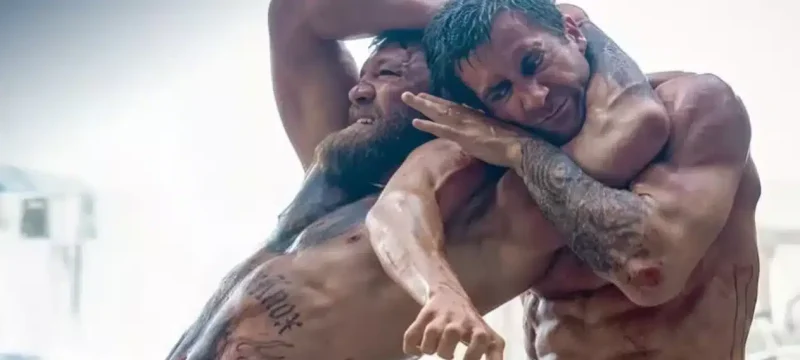I’m not particularly fond of action movies, so when I reluctantly agreed to watch Road House, I found myself surprisingly engaged. Although my interaction with the storyline wasn’t entirely positive, there was an inexplicable allure about the film that caught my attention – until I finally pinpointed it.
The 2024 version of Road House, featuring Jake Gyllenhaal and Conor McGregor, seemed strikingly reminiscent of Bollywood in its execution, prompting me to pause and reflect. Jake’s character, Elwood Dalton, an ex-UFC fighter grappling with personal demons, could easily be swapped with any of Salman Khan’s indomitable protagonists without altering the essence of the film. Similarly, Conor McGregor’s portrayal of the menacing enforcer Knox felt like a quintessential Bollywood villain. However, this comparison doesn’t serve as a compliment to either Road House or Bollywood.
Also Read: Ayeza Khan and Feroze Khan Join Forces for Upcoming Project
Now, admittedly, my exposure to cinema beyond Indian films is quite limited. Having grown up solely on Indian cinema, my cinematic taste is somewhat restricted. Perhaps this is why Road House felt oddly familiar, reminiscent of a parallel universe version of a Salman Khan film.
Make no mistake, Road House isn’t a carbon copy of a Bollywood action flick. However, it can’t escape criticism for its liberal use of characters reminiscent of those found in Bollywood. Jake’s portrayal of Elwood, with his unyielding demeanor and seemingly invincible nature, mirrors several characters Salman Khan has portrayed in recent years. He effortlessly survives life-threatening situations and manages to secure a job while nursing his wounds. Women swoon over him as he nonchalantly shrugs off his shirt.
As the bouncer of the aptly named Road House, Elwood is handsomely paid while predominantly shown sipping drinks and delegating his responsibilities to others through montages. His approach to conflict resolution, akin to Salman Khan’s Bhaijaan from a parallel universe film, revolves around dialogue and introspection. When diplomacy fails, he unleashes his fury akin to a Marvel superhero, disregarding collateral damage. Little remains of Road House after he’s dealt with Conor.
As for Conor’s character Knox, the similarities with Crime Master Gogo are minimal, except for their shared propensity for absurdity. Knox oscillates between being silly, goofy, funny, and maniacal. Despite Conor’s imposing physique and erratic behavior, Knox lacks intimidation factor. One might speculate whether the director hesitated to direct a UFC fighter heavily under the influence to portray anything other than himself on camera.
There’s much happening in the film, but it’s so forgettable that it hardly warrants discussion. True to Bollywood conventions, the “love interest” has minimal screen time, despite saving the hero’s life. There’s even a random crocodile thrown into the mix, not as a companion to the protagonist, but simply because it’s a crocodile. A couple of double-crosses and plot twists drag the runtime past two hours, which could easily be trimmed down.
Is Road House meant to be taken seriously? Weeks later, I’m still uncertain. I approached it with the same level of seriousness I’d reserve for a Salman Khan film. Depending on one’s stance as a fan, this information may guide their viewing choices.









